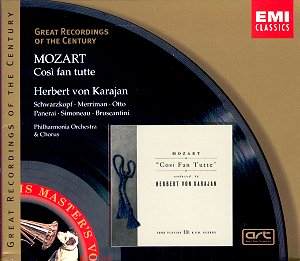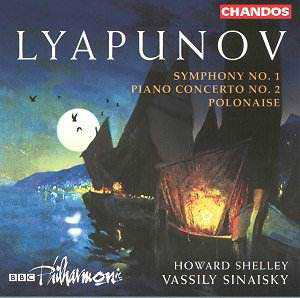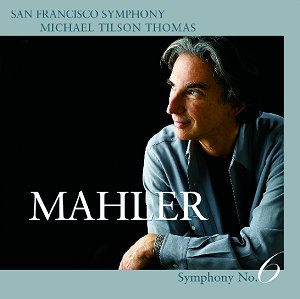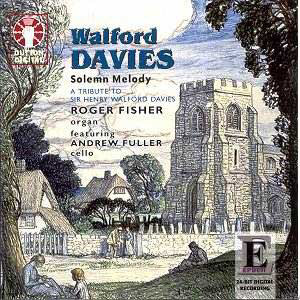 Composer: Wolfgang Amadeus Mozart
Composer: Wolfgang Amadeus Mozart
Works: Così fan tutte
Performers: Elisabeth Schwarzkopf (soprano, Fiordiligi), Nan Merriman (mezzo, Dorabella), Lisa Otto (soprano, Despina), Léopold Simoneau (tenor, Ferrando), Rolando Panerai (baritone, Guglielmo), Sesto Bruscantini (baritone, Don Alfonso), Philharmonia Chorus and Orchestra/Herbert von Karajan
Recording: Recorded on July 13th 1954 in Kingsway Hall, London and July 14th-16th and 19th-21st, 1954 in No. 1 and No. 3 Studios, Abbey Road
Label: EMI
Mozart’s Così fan tutte, often regarded as one of his most sophisticated operas, delves into the complexities of love and fidelity with a blend of humor and poignancy that has captivated audiences since its premiere in 1790. This recording, featuring the esteemed Herbert von Karajan at the helm of the Philharmonia Orchestra, captures the youthful exuberance and intricate musical fabric of the work while providing insight into the early interpretative choices of one of the 20th century’s most significant conductors. Originally released in 1955, this reissue stands as a testament to the enduring beauty of Mozart’s score and the artistry of its performers.
Karajan’s interpretation is marked by a vibrancy that elevates the opera beyond mere comedy to a rich exploration of its emotional undercurrents. The orchestral playing is nothing short of superb; the Philharmonia Orchestra delivers a warm, detailed sound that allows the various instrumental colors to emerge vividly. Notably, the wind solos, especially those of oboist Sidney Sutcliffe and horn player Dennis Brain, are breathtaking. The textures throughout are light yet full-bodied, and the flowing tempos maintain the opera’s inherent charm without succumbing to the pitfalls of excessive indulgence, a concern that often accompanies later recordings from Karajan’s career.
The vocal ensemble is strikingly cohesive, with each soloist complementing one another while also bringing individual strengths to their roles. Elisabeth Schwarzkopf’s portrayal of Fiordiligi is a standout, especially in her aria “Per pietà, ben mio, perdona,” where she navigates the wide intervallic leaps with remarkable ease, all the while expertly conveying the character’s inner turmoil. Nan Merriman’s Dorabella serves as an equally strong counterpart, her dramatic interpretation of “Ah, scostati! Smanie implacabili che m’agitate” showcases a commendable restraint that aligns perfectly with Mozart’s stylistic demands. The interplay between the two sopranos is enhanced by the rich, nuanced contributions of Rolando Panerai as Guglielmo, whose voice resonates with a convincing edge in pieces like “Sento, oddio, che questo piede.”
Karajan’s mastery of pacing is particularly evident in the recitatives, which flow seamlessly and engage the listener, marking a distinctive feature of this recording. The ensemble numbers, too, are performed with a palpable sense of theatricality; the chorus exudes vitality, although one might wish for a bit more exuberance in “Bella vita militar!” The engineering, despite being mono, is of high quality, presenting an intimate sound that draws the listener into the drama unfolding on stage. The clarity of the recording allows for the subtleties of the orchestration and vocal lines to shine through, ensuring that no detail is lost.
The historical context surrounding this recording is also significant; it arrives during a period when Così fan tutte was often overshadowed by the more popular Le nozze di Figaro and Don Giovanni. This recording reasserts the opera’s place in the repertoire, revealing its intricate interplay of character and emotion. Comparatively, while the later Böhm recording from 1963 is often lauded, Karajan’s interpretation captures a freshness and spontaneity that feels deeply rooted in the theatrical traditions of the mid-20th century.
This rendition of Così fan tutte is a vibrant, insightful interpretation that encapsulates the essence of Mozart’s comic opera. It represents a remarkable synthesis of musicality, theatricality, and ensemble cohesion, making it an essential listening experience for any aficionado of Mozart or opera in general. The performance’s delightful energy and the high caliber of the soloists ensure that it will continue to resonate with audiences for years to come.



